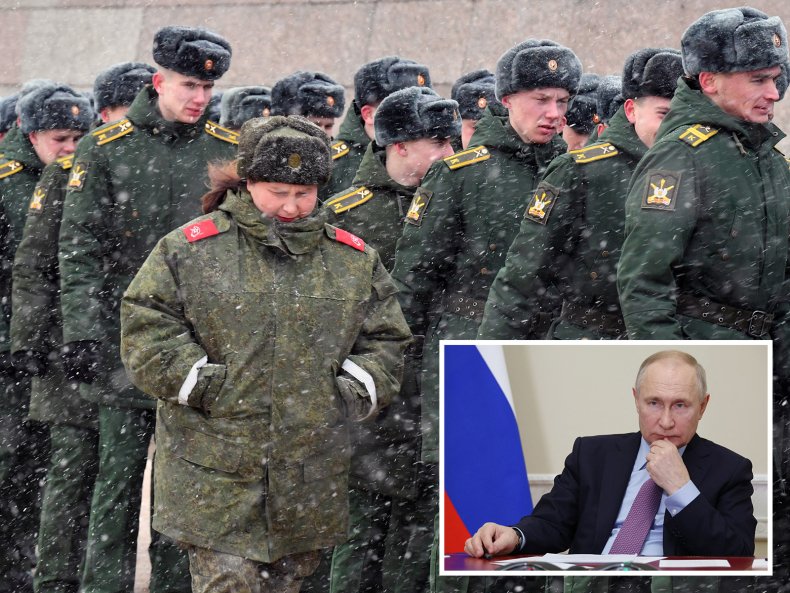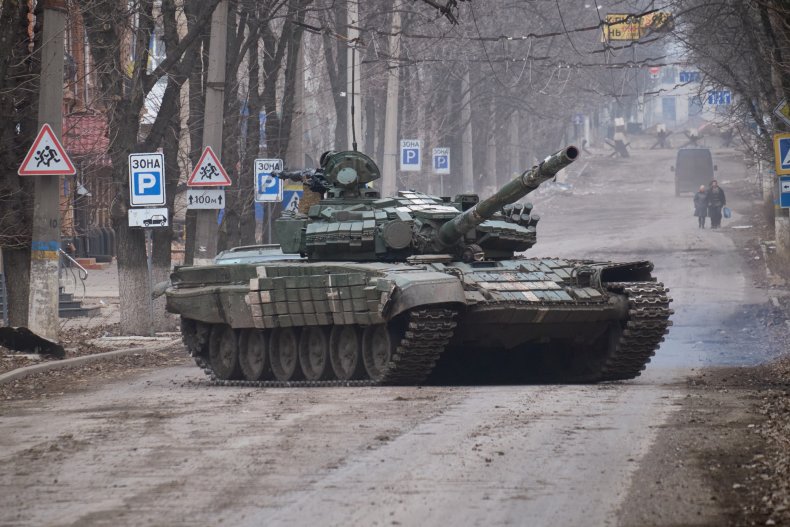BRENDAN COLE
Vladimir Putin had his eye on his place in Russian history when he compared his invasion of Ukraine to the expansionism of Peter the Great. "It has fallen to us, too, to reclaim and strengthen," Putin said in June 2022.
But the tsar was the beneficiary of cold weather in 1708 and 1709 during the Great Northern War, which helped stop Sweden's Charles XII's troops from advancing on Moscow, military historian Antony Beevor wrote in Foreign Affairs last month.
Beevor noted that while the winter has been an asset for Russian war efforts, such as Napoleon's Grande Armée retreat from Moscow in 1812 and the turning back of Adolf Hitler's forces from the capital in World War II, Putin cannot count on the coldest season being the same ally.
"It may be Russia, rather than its adversary, that suffers the worst consequences," Beevor wrote as reports abound of shortages of body armor, equipment and training for Putin's troops, especially the estimated 300,000 newly mobilized reservists.
 Above, military cadets gather at the Peter and Paul Fortress in St. Petersburg, Russia on November 19, 2022. Inset: Russian President Vladimir Putin. Ukraine's forces entered the winter with momentum in the war after retreats by Putin's troops.GETTY
Above, military cadets gather at the Peter and Paul Fortress in St. Petersburg, Russia on November 19, 2022. Inset: Russian President Vladimir Putin. Ukraine's forces entered the winter with momentum in the war after retreats by Putin's troops.GETTY"The curious thing about the Napoleonic and the Hitler invasions is that in both cases, the invaders thought they were going to be achieving victory before winter set in and so they didn't properly prepare their troops for the winter climate," William Courtney, a former U.S. ambassador to Georgia and Kazakhstan and now an adjunct senior fellow at the non-profit Rand corporation told Newsweek.
"In the current circumstances it looks like Russia is making the same mistake," Courtney said.
"The Ukrainians seem to be better prepared with winter provisioning than the Russians are so it's not clear that Russia would see winter as having an advantage than in Stalingrad for example," he added, referring to the pivotal World War II battle.
Putin's troops have complained they are short of basic equipment, with Russian citizens reportedly having to crowdfund to pay for socks, winter clothes and even body armor.
"Think about that at scale compared to the Ukrainians who are getting literally the best uniforms, boots and equipment in the world shipped to them," said Dale Buckner, a former Green Beret and CEO of the international security firm Global Guardian, which has intelligence teams in Ukraine.
"We think that Ukrainians are postured both at the individual level and their supply chain that they would have the advantage, not the Russians, in extreme cold weather," Buckner told Newsweek.
The Mobilization Factor
Kyiv has repeated its claims that Putin is planning another mobilization. The partial call-up he announced in September was widely criticized for thrusting people not fitting draft criteria onto the front line.
But this is still providing Russia with more manpower and much depends on how well recently mobilized soldiers can eventually be integrated into an effective fighting force.
"If you can train soldiers, that mass can be an important factor on the battlefield," said Courtney, explaining that "mass is more important for defensive rather than offensive operations" even if the ability "to be effective in offensive operations will be limited."
Ukraine's forces entered the winter with momentum following an offensive at the end of August which saw gains including retaking Kharkiv Oblast, parts of the Donetsk Oblast, and the right bank of Kherson Oblast.
Both sides have committed significant resources to the monthslong battle for Bakhmut in the Donetsk region, with Russian forces spearheaded by the Wagner Group of mercenaries.
But the 2023 Global Risk Forecast by international risk management firm Crisis 24, seen by Newsweek, predicted that winter will likely see Putin's troops maintain a mostly defensive posture which will give time for their remaining new reservists to be trained.
There may be a decrease in combat intensity, except for some Ukrainian offensives to maintain momentum, and Russia trying localized advances and long-range strikes on infrastructure, it said.
Buckner said that even if Russia could mobilize 300,000 people they were likely to be used to maintain the terrain Moscow controls out of Crimea and the Donbas region, and not focus on more offensives. If Russia is in that posture, "it's much easier to sustain that and just stay static for an enduring period of time," he said.
Meanwhile, Crisis 24 predicted that after integrating its mobilized troops, the Russian high command may try a late winter or early spring offensive to break through Ukrainian lines, most likely in the Donetsk or Luhansk regions.
"However, any such operation will almost certainly fail to achieve its main objectives," it said, due to Russian military command-and-control problems, low troop morale, and ineffective supply and logistics.
 A Ukrainian tank blocks a street in Bakhmut on December 24, 2022. The city in the Donetsk Oblast has been hard fought over for months.PIERRE CROM/GETTY IMAGES
A Ukrainian tank blocks a street in Bakhmut on December 24, 2022. The city in the Donetsk Oblast has been hard fought over for months.PIERRE CROM/GETTY IMAGES"The Russians are investing a lot of hope in the coming winter," Vuk Vuksanovic, an associate at the London School of Economics foreign policy think tank, LSE IDEAS said, referring to strikes against energy infrastructure aimed at freezing the Ukrainian population.
But he told Newsweek that reports of Russian equipment shortages, which have been around since the start of Putin's invasion on February 24, should be treated with caution.
Russia's moves in Belarus keep Ukraine on alert
"Confirmation of whether these reports are true will probably arrive on the battleground since Ukraine is also faced with a tough time of being entirely dependent on the support of Western allies to preserve its economy and military."
This includes the Patriot Missile systems which Ukrainian servicemen will start training on in Oklahoma next week. The United Kingdom is also reportedly considering supplying Challenger 2 tanks which could push Germany to give Ukraine the Leopard II tanks it has long requested. Meanwhile, Kyiv's demands for more arms continue.
Ukrainian Forces Still Vastly Outnumbered
Military and strategic studies specialist Allan Orr believes some western assessments of the progress of Ukraine's offensives have been overly optimistic. He said that whatever happens over winter, Ukraine's troops are vastly outnumbered by Russian forces which they cannot wear down at a level high enough to win.
"This winter will show if Russia takes the conservative route, and just keeps methodically punching forward, or gets imaginative. If it gets imaginative, it would be an indication Putin knows he's pressed for time in the east," he told Newsweek.
"Unless the West bites the bullet and provides Ukraine much more wherewithal and finds a workaround to Ukrainian losses, all while navigating the un-navigable nuclear risk, every winter from here out will be risky for Kyiv," he said.
"General Winter will again do to the war what it did to Napoleon. But nobody can say whether Putin or Zelensky will be the 21st-century Bonaparte."
No comments:
Post a Comment